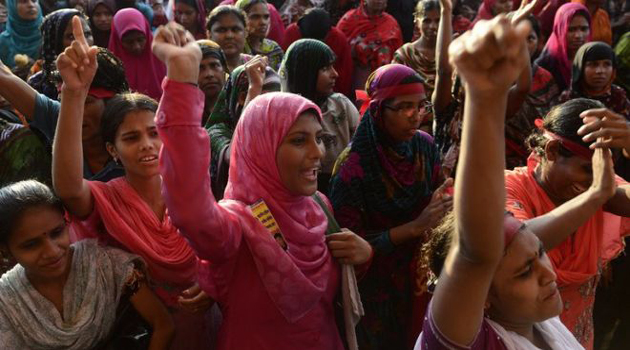
Bangladeshi garment workers shout slogans during a protest on wage increases in Dhaka on September 21, 2013/AFP
DHAKA, September 23 – Angry Bangladeshi garment workers blocked roads, set factories alight and clashed with police for a third day on Monday as protests demanding a minimum monthly wage of $100 spread outside the capital Dhaka.
Abdul Baten, police chief of the Gazipur industrial district near Dhaka which is home to hundreds of factories, told AFP that “up to 200,000 workers” had joined the latest demonstrations.
His deputy Mustafizur Rahman said about 300 factories, which make clothing for top Western retailers such as Walmart, were shut on Monday to contain the violence as protesting workers attacked plants that stayed open.
“The situation is extremely volatile. Police fired rubber bullets and tear gas to disperse the unruly workers,” he told AFP, adding workers attacked more than a dozen factories with rocks.
Dozens of workers and several policemen were injured, he added.
Manufacturers said Monday’s protests were some of the worst in the sector since 2010 when months of demonstrations forced the government and factory owners to agree to a minimum monthly wage of 3,000 taka ($38).
Bangladeshi textile workers are among the worst paid in the sector worldwide, and often toil for 80 hours a week in factories which are vulnerable to fires and other accidents.
Protests over poor wages, benefits and working conditions are frequent but have gained in intensity since April when a factory complex collapsed, killing more than 1,100 people in one of the world’s worst industrial disasters.
Union leader Shahidul Islam Sabuj threatened to hold non-stop protests unless the wages are hiked.
“$100 is the minimum we have asked for. A worker needs much more than that to lead a decent life,” he told AFP.
Thousands of workers, many carrying sticks, blocked roads that linked the capital with the northern and western region, disrupting traffic for hours.
“Prices of all commodities have spiked, but there is no change to our salaries for years,” said a protesting worker in Savar, where April’s disaster occurred.
“We won’t leave the streets unless we are paid a minimum 8,000 ($100) per month,” he told a local television station.
Impoverished Bangladesh is the world’s second-largest garment exporter with apparel shipments accounting for 80 percent of its $27 billion annual exports.
In June this year the government set up a panel to review salaries and unions have demanded an 8,114 taka ($100) minimum monthly wage.
Factory owners have rejected the demand, saying they can raise wages by only 20 percent to 3,600 taka due to gloomy global economic conditions.
In Savar, more than a dozen factories were shut down as protesters clashed with police, leaving around 20 people injured, said the deputy chief of Dhaka police Shyamal Mukherjee.
“Workers attacked our factories and set ablaze at least two plants. Hundreds of factories were forced to shut down,” said Reaz Bin Mahmood, vice president of the Bangladesh Garment Manufacturers and Exporters Association which represents 4,500 factories.
Thousands of workers also attacked a camp of a reserve police force, some 40 kilometres (25 miles) north of Dhaka, injuring three officers and breaking three rifles, the force’s senior officer Rafiqul Islam told AFP.
The unrest spread to the capital’s Tejgaon industrial area where thousands of workers clashed with police and protested outside the headquarters of a garment manufacturers’ association, police said.
Widespread protests seeking wage rises in 2006 and 2010 led to deadly clashes, leaving dozens of workers dead and hundreds of factories vandalised.


































